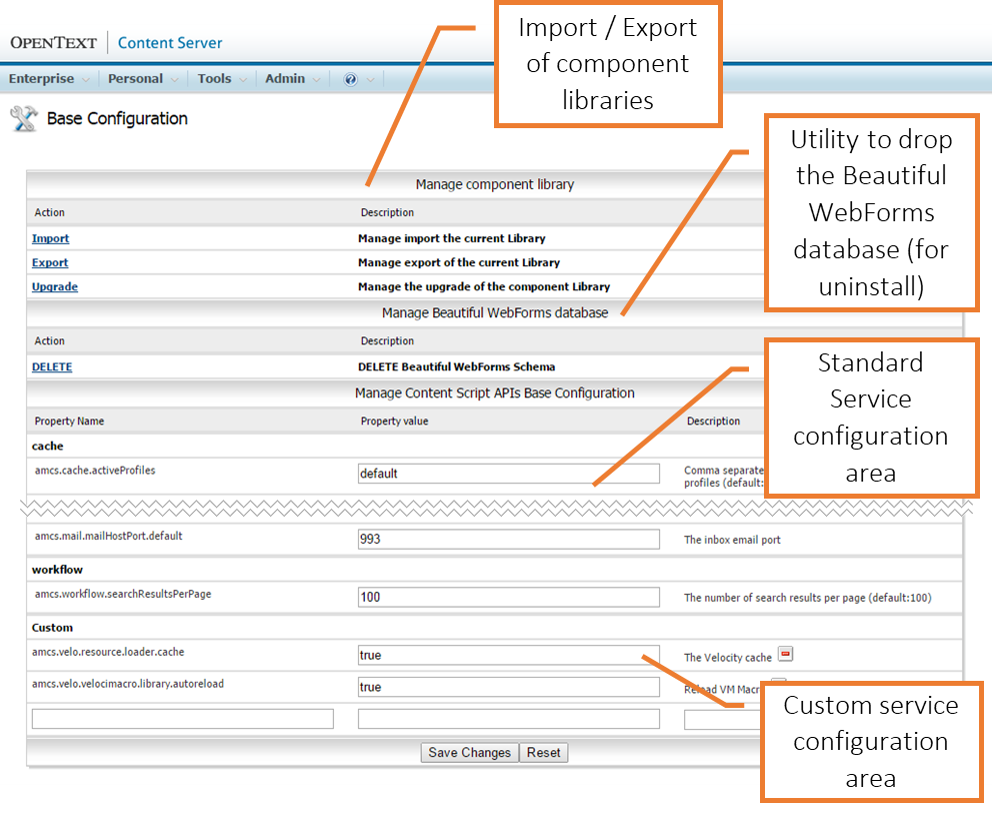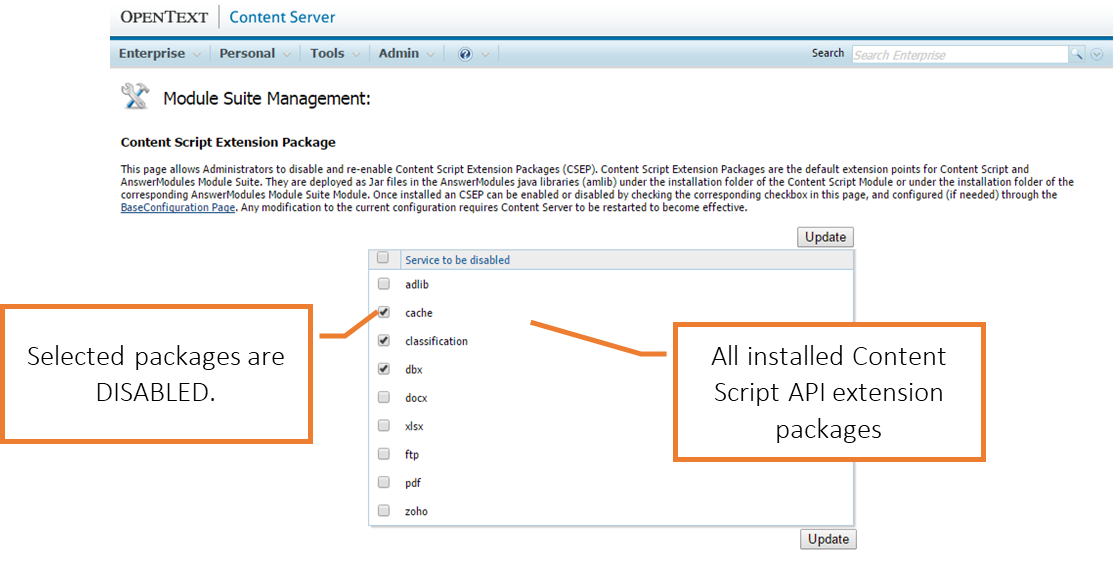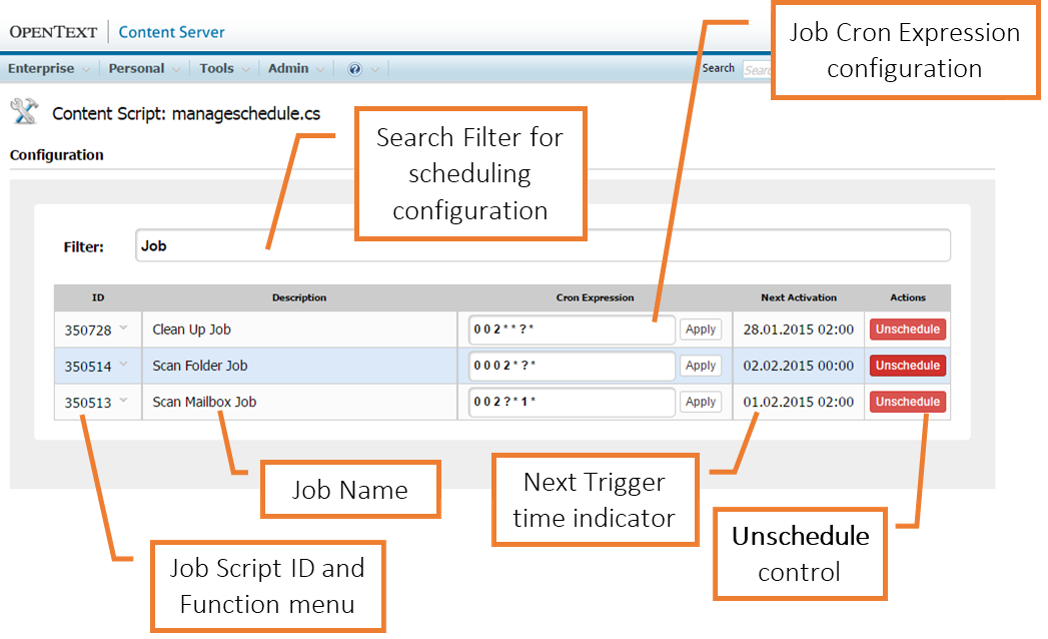Admnistrative pages
Settings and administration tools specific to ModuleSuite components can be accessed from the Content Server Administration pages.
Detailed information related to the single tools and configuration pages is provided in the following sections.

Base Configuration¶
The Base Configuration page provides access to:
-
utilities to perform initial import/upgrade/backup of the Content Script Volume contents
-
licensing status
-
ModuleSuite database maintenance utilities
-
global configuration of the Content Script engine, and configuration of the single API services
-
configuration of custom Content Script extension modules

Restart required
Every time changes are made to the Base Configuration, a Content Server restart is required.
Enable / Disable Module Suite features¶
The amcs.core.debugEnabled is a "core" configuration flag you can use to customize your Module Suite instance enabling/disabling ModuleSuite core features. Each bit in the mask represent a different feature that can enabled (0) or disabled (1).
Here below a reference for the meaning of each bit in the mask.
| Position | Meaning | Valid values | Decimal value |
|---|---|---|---|
| 1 | RESERVED | 0 | |
| 2 | Enable/Disable Module Suite internal cache (CSVolume, Form Templates, SubViews, Localization etc) | 0 (default)= cache enabled, 1=cache disabled | 2 |
| 3 | Callback script execution context mode | 0(default)= single execution context for each script of the chain, 1= shared execution context (same for all the scripts in the chain) | 4 |
| 4 | Content Script objects indexing | 0(default)= Content Script objects are not indexed by the search engine, 1=Content Script objects are indexed by the search engine | 8 |
| 5 | Track in the audit trail when a Content Script is executed | 0(default)= Do not track in the audit trail the execution of Content Scripts, 1=Track in the audit trail the execution of Content Scripts | 16 |
| 6 | Enable/Disable Asynch events management | 0(default)= Asynch events management is enabled, 1=Asynch events management is disabled | 32 |
| 7 | Perform the lookup to determined if there are script to be executed asynchronously when the event is raised | 0(default)= Any "interesting" event for Asynch events management is tracked in the Distributed Agent queue and the lookup required to determined if there are scripts to be executed is performed later on by the same DA worker that manages script execution, 1=The lookup required to determined if there are scripts to be executed asynchronously given the registered event is executed when the event is raised. The information is passed to the DA queue only if the lookup finds that there are scripts that need to be executed | 64 |
Example of valid configuration values:
- Enable Content Script indexing while disabling Module Suite cache: 8+2 = 2
- Enable Content Script execution audit trail while disabling Asynch events management: 16 + 32 = 48
Logging administration¶
The Content Script logging page allows administrators to configure the logging level of Content Script services and objects, and also provides quick access to the log file. Logging level can be changed at runtime without restarting the Content Server.
Each Content Script is identified by the two capital letters "CS" followed by the Content Script's DataID (e.g. CS12345).

Where is my log ?
Logging configuration is a server-instance configuration, please keep it in consideration when trying to set the logging level of a scheduled script (in clustered environments), since it could actually be executed on any server on which Distributed Agents are activated.
Manage API Services¶
The Content Script Extension Package management page allows to configure the availability of Content Script API services during script execution.
When installed, services are active by default. A Content Server restart is required whenever changes are made to Content Script API extension package availability.

Scheduling¶
The Content Script Scheduling administration panel provides a quick overview of the Content Script objects that are queued for scheduled execution, together with the next fire time, the expression used to calculate the execution schedule, and generic information related to the object itself. The object menu allows to easily access the node standard functions.

An unschedule utility allows to stop the scheduling of the corresponding script.
Configuration
The complete set of configuration options for Content Script scheduling (as well as impersonation settings) are available through the Content Script editor Administration tab
Manage Callbacks¶
The Callbacks management panel provides a tool to verify in every moment what Content Script callbacks will be executed for specific objects in response to specific event types.
Details on how to configure Content Script Callbacks are provided in the following sections.
